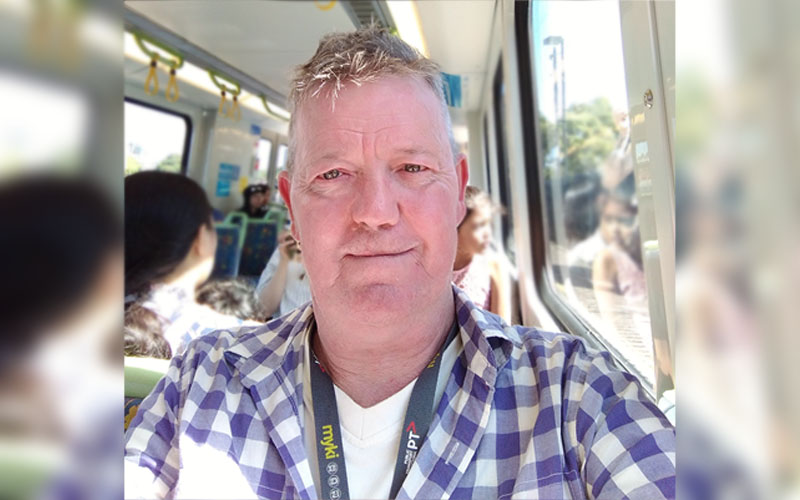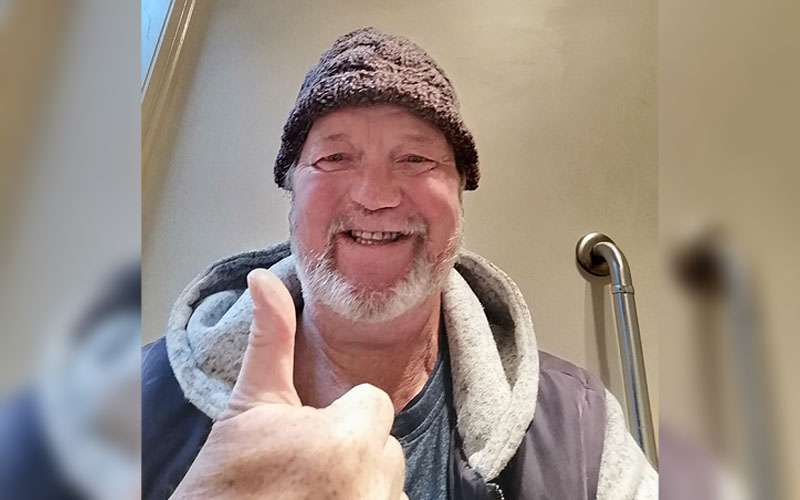It is estimated that there are over 29,000 people living with HIV in Australia¹.
But out of those 29,000, there is a significantly smaller number of those living with HIV AIDS.
AIDS (Acquired Immunodeficiency Syndrome) is the third and final stage of HIV infection which severely damages the body’s immune system, and makes it impossible for the body to fight off opportunistic infections².
People living with HIV often face discrimination resulting from a lack of understanding about the illness, its treatment and medication, and the impact of living with HIV.
For Daevid, the discrimination he’s faced has not only had its effect emotionally, but also on his ability to access fundamental support.
 Photo: Daevid, CatholicCare Victoria HIV/AIDS Ministry client.
Photo: Daevid, CatholicCare Victoria HIV/AIDS Ministry client.
Daevid was diagnosed with HIV AIDS in 2007 after experiencing a range of health issues and being dis-diagnosed for over 10 years.
He initially experienced weight loss, along with other health challenges which doctors attributed to work-related stress. But when things got so bad that Daevid couldn’t walk or talk, it was obvious something serious was wrong.
Daevid was admitted to hospital and, upon receiving his diagnosis, was told he wasn’t expected to live the next 72 hours. But to the doctors’ surprise, he prevailed.
The next eight months of Daevid’s life were spent in hospital isolation, while they worked to remove his body’s infections and helped him to gain back weight.
“And so that’s where the big problems started, despite everything I’d been through. I had to start taking 15 tablets three times a day. And yet, everyone thinks there’s no such thing as AIDS anymore, they think there’s only HIV which is controllable,” says Daevid.
“They don’t look at me as an AIDS patient, which I am. They look at me as a HIV patient, and that’s the basis of most of the discrimination I experience. They can’t see the effects of long-term medication.”
HIV in it’s first two stages of development are controllable with medication - meaning that the amount of HIV in a person’s blood can be reduced to undetectable levels, and progression of the virus in the body is stopped.
But with AIDS, the final stage of the Human Immunodeficiency Virus (HIV), this isn’t possible.
Side effects and discrimination – what it’s like living with HIV AIDS
Daevid, now aged 55, is living with polyneuropathy - meaning multiple peripheral nerves have been damaged in his central nervous system.
For Daevid, this means that his arms and legs will give way without notice, and he easily loses balance, both of which have led to many falls, bruises, and broken bones.
Polyneuropathy can be caused by a number of different things such as infections or diseases, physical trauma, or certain medications – and long-term use of HIV AIDS medication has been the cause for Daevid’s polyneuropathy.
“When I apply for funding support, they keep saying I just have neuropathy (weakness and numbness in the limbs) but it’s not. They look at me and they say there’s nothing wrong with me. They actually told me to get an eye test because of all the falls,” says Daevid.
“I got knocked back from support four times before my case was eventually brought higher up, where they realised I should have been receiving support five years ago. They don’t acknowledge that there’s still long-term survivors living with AIDS – they just class me as living with controllable HIV, that’s the issue.”
“I’m not able to do what I used to be able to do. I’m very limited in my movement. I’ve now got a motorised wheelchair and I got rid of my car because I can’t drive.”
Unfortunately, Daevid hasn’t only experienced discrimination from support workers, but also from the community.
Several months ago, Daevid visited a new fast-food restaurant but found that there was no wheelchair accessible entrance.
Upon looking around and finding no accessible door, Daevid resorted to using the drive-through on his motorised scooter. Which was fine, until recently…
“Last month when I tried to use the drive-through again, the manager told me that I had to get off and come in the front door, and that they wouldn’t serve me through the drive-through. I explained that I couldn’t get in, because they had three steps leading into the front door,” says Daevid.
“It was so confusing and embarrassing. They humiliated me, there were so many people in the car park. The embarrassment of me trying to say I can’t come through the front door because I’m on a mobility scooter was too much, I won’t go back there.”
“Just recently, I found out that they do in fact have a wheelchair accessible entrance which is hidden and only accessible through the drive-through. They didn’t even tell me about it, it’s like no one knew.”
Support and advocacy for HIV AIDS survivors
Daevid met Marg Hayes, Coordinator of CatholicCare Victoria’s Catholic HIV/AIDS Ministry, in the year after his diagnosis.
Our Catholic HIV/AIDS Ministry offers support to people living with HIV and to their loved ones, providing a safe space to chat about the challenges of living with HIV, and creating an environment where people feel safe to just be who they are, without judgement.
“Marg has been wonderful. I met Marg in 2008, and she asked if I would come along to the HIV/AIDS lunch group she runs. It took me three months to get there because I was timid and embarrassed. But when I got there, it was friendly and open, and I’ve been going to those weekly lunches ever since. Marg has always been there when I need her,” says Daevid.
“You can go there and talk about whatever you want to talk about. They don’t look down at you, and we’re all treated as equals.”
Unfortunately throughout COVID lockdowns the HIV/AIDS weekly lunches have been postponed, but the group still catch up through video calls and occasional lunches when possible.
“The lockdown hasn’t helped because I’ve been isolated and haven’t been able to go anywhere. And that’s made me more depressed… I’ve got worse over the last three years, and Marg has watched me decline.”
“But my ex-partner runs around and gives me a lot of support during the week. We go out to bingo together and he takes me out shopping. And I have my garden which I love, I get on my hands and knees and drag myself around to do a bit of gardening, and I get to a rock to try to get myself up haha.”
 Photo: Daevid, CatholicCare Victoria HIV/AIDS Ministry client.
Photo: Daevid, CatholicCare Victoria HIV/AIDS Ministry client.
When we asked Daevid if there was one thing he wanted to advocate for regarding HIV, he said he wants others not to judge a book by its cover.
“Just because someone’s got HIV, it doesn’t mean they are a threat to society. Back when I was first diagnosed, I remember people used to bleach the bar and bleach the cutlery because they didn’t understand how it was transmitted.”
“You wouldn’t know, if you looked at me and you saw me in the street – you wouldn’t know there was a problem and you wouldn’t know about my diagnosis,” says Daevid.
“It’s just that you might think I’m a 98-year-old in an electric wheelchair who can’t walk. But the more we talk about HIV, the more people will understand.”
Learn about our Catholic HIV/AIDS Ministry here.
Let’s end discrimination with awareness. Learn more about HIV here.
Liz Gellel | Marketing Coordinator – Digital Lead
Sources:
Read more: